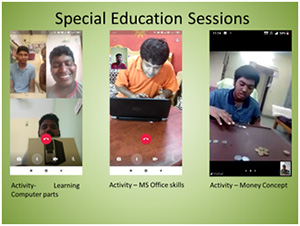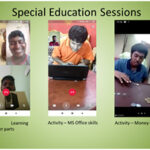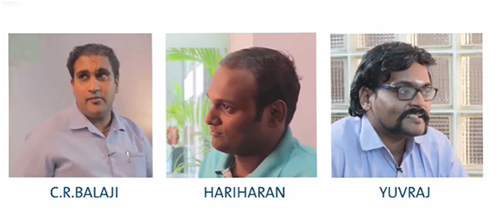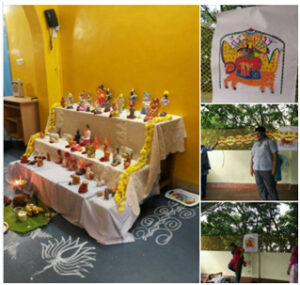June – Oct 2020 Newsletter

Dear All
Hope this newsletter finds you all in good health and cheer.
We at Swabodhini are finally managing to come to terms with the new normal after the pandemic turned our lives topsy turvy. Many of our parents and staff were finding it difficult to fend for their families in these pressing times. The students were getting restless at home as they were confined indoors.
With the financial strain that this pandemic has placed on companies and individuals, our access to funding has also been impacted considerably. I would like to take a moment to thank our sponsors without whose help we could not have come this far. We look forward to your continued support to ensure seamless operations.
In the midst of all the challenges we also have much to cheer for, as this year also marks the completion of 10 yrs of work experience for 2 of our students who were placed with Grundfos Pumps India Pvt. Ltd. One of our Vocational Course students has gained admission in to the Visual Communication course in Guru Nanak College.
After much deliberation and planning we commenced online classes for all the children in June. The results are so heart-warming and the students, parents and staff have been more than co-operative.
Things have already started looking brighter with the festive season. Wishing you all a Happy Navratri and a great Diwali (in advance).
Stay home and stay safe.
Radha Ganesan
Founder / Managing Trustee
Swabodhini School and Vocational Center
Online Classes commenced in June
After much deliberation and planning we commenced online classes for all the children in June.There were many factors in support of commencement-
Some factors against commencement of online classes-
After considering all the pros and cons, the school decided to commence online classes.
An important milestone!!
We would like to congratulate 2 of our students (Mr. C.R. Balaji and Mr. Hariharan) who recently completed their 10th work anniversary in Grundfos Pumps India Pvt. Ltd. Another student of Swabodhini, Mr. Yuvraj started working with Grundfos in 2016. They work in various capacities within the company’s manufacturing plant situated in Thoraipakkam, Chennai.
Today not only are they on the same footing as their peers, they are also active contributing members to their families. World over, the young adult autism population faces significant challenges to employment. In a world where their competency is questioned on a regular basis and society is still taking baby steps at appreciating the value that these people bring to the table, this success story comes as a breath of fresh air. Our heartfelt thanks to the staff and Management of Grundfos Pumps India Pvt. Ltd. for having given them the opportunity and going the extra mile in ensuring that they get a platform to prove themselves. Sharing a snapshot from Grundfos India’s Facebook page:
Click here to view the video that Grundfos has uploaded to their Facebook Page.
We would like to thank Mr. Nikhil Nair of Eyeronik Productions for his effort in shooting and editing this video!!
INTACH Club workshop for school teachers and principals
On Sep 12,2020, 2 of our School teachers attended the workshop conducted by Intach (Indian National Trust for Art and Cultural heritage). Ms. Vimala Srinivasan, Head of Education also attended a workshop for School Principals on Sep 11, 2020. The aim of the workshop was to equip the staff that run the Heritage Clubs in schools, sensitize them oninformation that is available online, motivate teachers to play an effective role in sensitising children about heritage, events conducted by various Intach clubs- quizzes, Storytelling sessions etc; There were participants from over 11 schools in the workshop.
Managing Behaviours Through Behaviour Therapy
Article by Ms. Usha Venkatesan
Ms. Usha has over 30 years of experience in assessing, planning IEP and rendering educational and behavioral intervention. At Swabodhini she conducts workshops for staff, parental counselling, cognitive and vocational assessments for children, strategies for accommodating the children in school and at home
Behavior therapy had been introduced at Swabodhinito encourage positive and acceptable behaviors and to reduce the unacceptable/challenging behaviors. It is an individualized and comprehensive approach that parents and teachers use to teach and encourage students to behave in appropriate ways. The therapy is implemented by everyone involved with a child on a day-to-day basis and Interventions happen in the natural environment where the behavior occurs.
Initial referral is done after systematic observation by the teachers and parents, the student’s behaviors which interfere with the learning, social acceptance; healthy life style, safety and security of themselves and others are identified and analyzed systematically by ABC model.
Considering behavior as an ABC sandwich:
Antecedents – What are ‘triggers’ for the behavior? Finding out the cause of the behavior.
Behavior –The way your child responds to the trigger. Finding out –
Consequences or ‘rewards’ – This is what your child gets out of behaving this way.
How did the behavior stop, did any one intervene, was he allowed to do what he wanted? For example, they might be allowed to go on with a favorite activity, or to leave a stressful situation.
Systematic observation of the behavior is done to find out the trigger, how frequently the behavior happens, when, where, with whom, how frequent does it occur and how does it stop.Systematic behavior management is planned on individual basis and implemented.Sensory issues/over loads causing the behavior are followed up with sensory integration training.Parents are counseled to follow up the similar behavior management at home.
Behavioral Interventions deal with student’s unacceptable/challenging behavior by changing either the behavior’s triggers or the ‘rewards’ the student gets from the behavior. During Behavioral Interventionsstudents are taught the alternative, more appropriate behavior to replace the unacceptable/challenging behavior. Students receive constant and consistent positive reinforcement for the positive and acceptable behaviors.
They are given behavior specific feedback, ample verbal praise and reinforcement immediately and in a way that is meaningful to the particular person. Strategies for dealing with increased levels of agitation and anxiety in order to reduce meltdowns are also taught.
We do advocate and practice the following proactive strategies in order to facilitate child’s coping and adaptation.
Navratri @ Swabodhini
Navratri is usually celebrated with great fervor in Swabodhini. Given that school is yet to reopen, we are all missing the fun of getting together over golu, sundal and cultural performances. Just thought we could share some snippets of Navratri@ Swabodhini from the previous years. Wishing you all a wonderful Navratri with your near and dear ones!!









